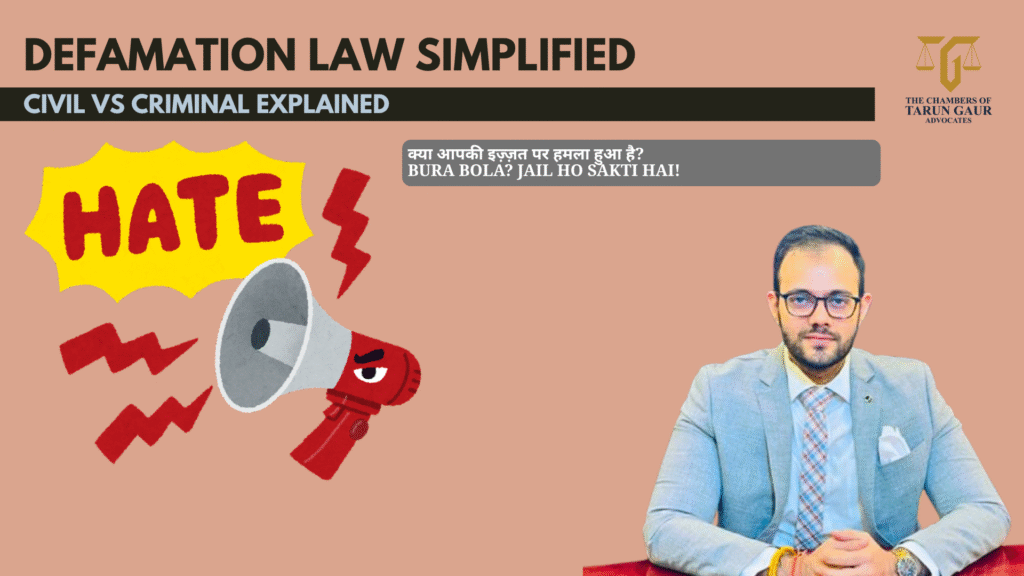In a digital age where words travel faster than ever, defamation remains a critical legal issue, especially in India where both the reach of the internet and the diversity of social discourse are vast. Whether it’s a heated Facebook post, a viral video, or an editorial in a newspaper, defamatory content can severely impact a person’s dignity and reputation.
This blog post explores the concept of defamation in Indian law, the common issues faced by individuals, and the legal remedies available.
What is Defamation?
Defamation refers to any spoken or written statement that harms the reputation of an individual, business, group, or organization. Under Indian law, defamation can be both a civil wrong (tort) and a criminal offence.
There are two types of defamation:
- Libel – Written or published defamatory statements.
- Slander – Spoken defamatory statements.
Legal Framework Governing Defamation in India
1. Civil Defamation
- Basis: Common law principles of tort.
- Remedy: Damages (monetary compensation) for harm caused to reputation.
- Burden of Proof: On the plaintiff to show the defamatory nature of the statement, and that it refers to them and has caused reputational harm.
2. Criminal Defamation
- Governing Law: Sections 499 and 500 of the Indian Penal Code (IPC), 1860.
Section 499 IPC defines defamation and includes exceptions (such as fair criticism, truth made for public good, etc.).
Section 500 IPC prescribes punishment: imprisonment up to two years, or fine, or both.
Issues People Commonly Face in Defamation Cases
- Proving Reputational Harm: In civil cases, proving actual damage to one’s reputation or loss of livelihood can be challenging.
- Lengthy Legal Process: Defamation suits, especially civil, can be long-drawn and expensive.
- Freedom of Speech vs. Reputation: There is often a fine line between exercising free speech (Article 19(1)(a) of the Constitution) and defamatory expression. This balancing act complicates both litigation and public discourse.
- Online Defamation: With the explosion of social media, defamatory content can be instantly disseminated and hard to control or retract. Identifying anonymous posters and jurisdictional challenges add to the problem.
- Misuse of Criminal Defamation: Critics argue that criminal defamation can be misused to stifle dissent, investigative journalism, and whistleblowing.
Remedies Available under Indian Law
Civil Remedies
- Suit for Damages: Victims can file a civil suit for monetary compensation in a civil court.
- Injunctions: A court may restrain the defendant from making further defamatory statements or order the removal of such content.
Criminal Remedies
- Filing a Criminal Complaint: The aggrieved person can file a criminal complaint before a magistrate.
- Punishment: If convicted under Section 500 IPC, the accused may face imprisonment, fine, or both.
Online Defamation Remedies
- Under the Information Technology Act, 2000, victims can also seek removal of defamatory content from platforms by contacting intermediaries (like Facebook, Twitter, etc.) and invoking Section 79 and associated IT Rules.
- The aggrieved party may also approach the Cyber Crime Cell for assistance.
Defenses Against Defamation
Indian law recognizes several valid defenses to a defamation charge:
- Truth (if it is in public interest)
- Fair Comment (on matters of public concern)
- Privilege (absolute and qualified)
- Consent (of the person allegedly defamed)
Recent Developments and Judicial Trends
The Supreme Court in Subramanian Swamy v. Union of India (2016) upheld the constitutionality of criminal defamation, reiterating that the right to reputation is an integral part of Article 21 (Right to Life). However, courts have also increasingly leaned towards protecting free speech and have been cautious in granting relief in borderline cases.
Conclusion
Defamation laws in India aim to strike a balance between protecting individual reputation and upholding freedom of expression. While remedies exist in both civil and criminal law, practical challenges persist—especially in the digital sphere.
If you believe you’ve been defamed, or are facing a defamation suit, it’s crucial to consult a legal expert to assess your case and respond strategically, keeping in mind both legal rights and social responsibilities. The guidance of a highly skilled professional like Advocate Tarun Gaur (All India Rank 1) can be the key to availing the remedies available, effectively.

